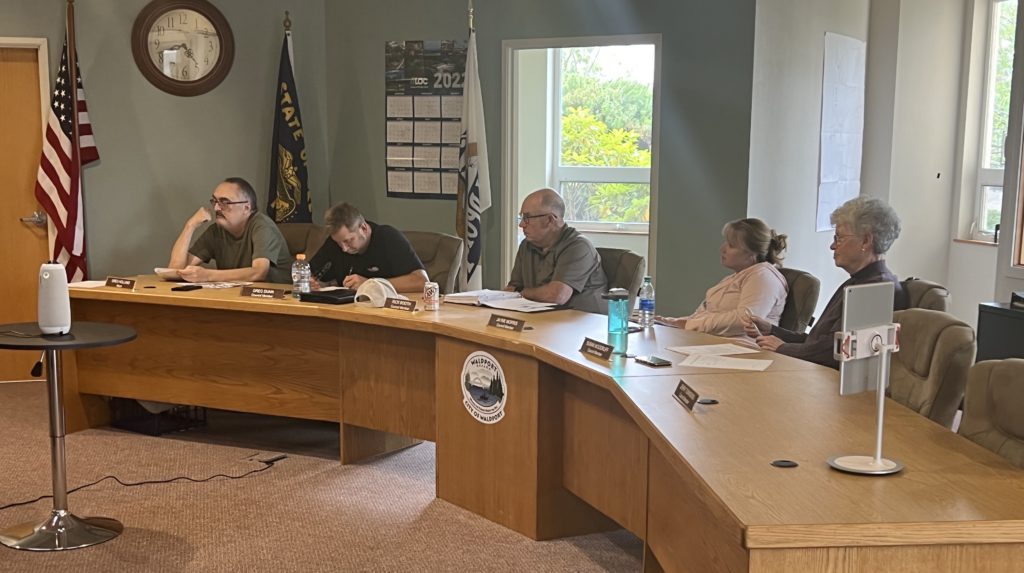
By QUINTON SMITH/YachatsNews.com
WALDPORT – The Waldport City Council has given its city manager the OK to begin gathering information on two ideas to potentially help ease the city’s housing crunch – allow people to live in recreational vehicles alongside someone’s home and going to a single zoning system for all residential areas.
The RV idea would be an emergency program with strict guidelines on their setup and use, city manager Dann Cutter told the council Thursday. The re-zoning effort would be given to the Planning Commission to figure out and take much more time.
But both could help ease the pressure on affordable housing in the area, he said.
“We’re going to see more people, including working people, having to reconsider their housing situation,” Cutter said in an earlier council discussion on homeless issues.
In their travels around town, Cutter said, city staff and council members know “There are at least five trailers we pass every day where we all know someone is living in it.” Those draw at least one complaint a week to the city, he said.

“These could be kids or parents down on their luck,” he said. “They don’t have anywhere to go. This could be a safe place.”
So, Cutter asked the council to give him permission to begin working on an “emergency program” allowing people to live in an RV in a residential neighborhood if it is hooked up to the city’s sewer system, has its own electrical and water connections, passes a fire safety inspection, and meets to-be-determined specifications for placement and appearance.
Councilors agreed that the idea could have merits, especially to codify and clean up a practice that’s become common. They suggested a requirement that RVs not be allowed on grass, but only on a hard surface of gravel, asphalt or concrete and that the program be reviewed 1-2 years after it is established to see if it is working.
“I like the idea,” said Councilor Greg Dunn. “It’s not that hard to hook up to sewer, water or electricity.”
Others said the city should make clear guidelines on appearance and safety.
If approved, the RV living program could not replace or overrule any stricter rules on property from deed covenants or homeowner association rules. They could also not be used for short-term vacation rentals, but be rented for 30 days or longer – like the city’s new rules on accessory dwelling units.
Cutter said he would look to other cities and collect other ideas on how the program might work, and return with a more specific proposal to discuss in September. Any formal vote could come in October or November.
Commission to tackle zoning idea
The idea of going to one zoning designation for residential areas will take more time and will be more complicated, Cutter told the council. After a short discussion, the council agreed to ask the Planning Commission to tackle the idea.
Currently residential areas are zoned four ways — R-1 for single-family homes, R-2 for duplexes or single-family, R-3 for multi-family, duplexes or single-family, and R-4 for motels, multi-family, duplexes or single-family residences.
Cutter said it is clear from a state-mandated housing study now under way that Waldport has lots of vacant, residentially zoned property inside the city limits. That means it will be difficult to convince the state to allow Waldport to extend its urban growth boundary to create more residential building lots.
But much of the current residentially zoned land is very steep or hard and expensive to develop.
“A great example of this is the end of Range Drive where a multifamily housing complex sits next to two duplexes which then sit next to several single-family homes,” Cutter wrote in his staff report.
Several developers have projects underway, he said, where they are “contorting themselves” to meet R-1/single family zoning requirements. Allowing a duplex or townhouses could be a solution, he said, lowering development costs to developers and potentially creating more affordable housing.
“There’s a number of sites around the city that would be easier to develop as townhomes or condos versus single family homes,” he said.
In other business Thursday, the council:
- Approved the purchase of 14 acres of the former “Ball House” property east of Crestline Drive for $85,000 to protect sewer and water infrastructure leading to the city’s wastewater treatment plant below near Lint Slough. The property won’t be developed, but could be used to connect hiking trails;
- Instituted a 5 percent utility franchise fee on Southwest Lincoln County Water PUD, which uses city rights-of-way to serve an estimated 80 customers on the south edge of the city. Cutter estimates it will add $3.50 a month to those water bills and net the city $3,400 a year;
- Began a discussion on how to implement “time, place and manner” rules dealing with where homeless people could be allowed to camp on public property in the city. This stems from a U.S. Court of Appeals ruling from Idaho that prohibits cities from summarily banning homeless camping on public land, but allows them to create rules governing it.


